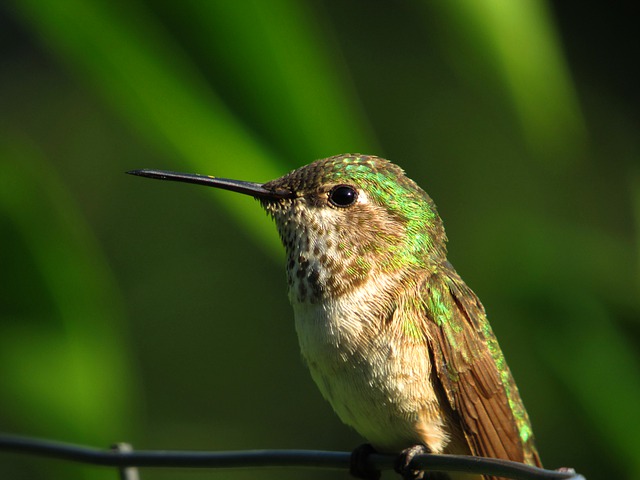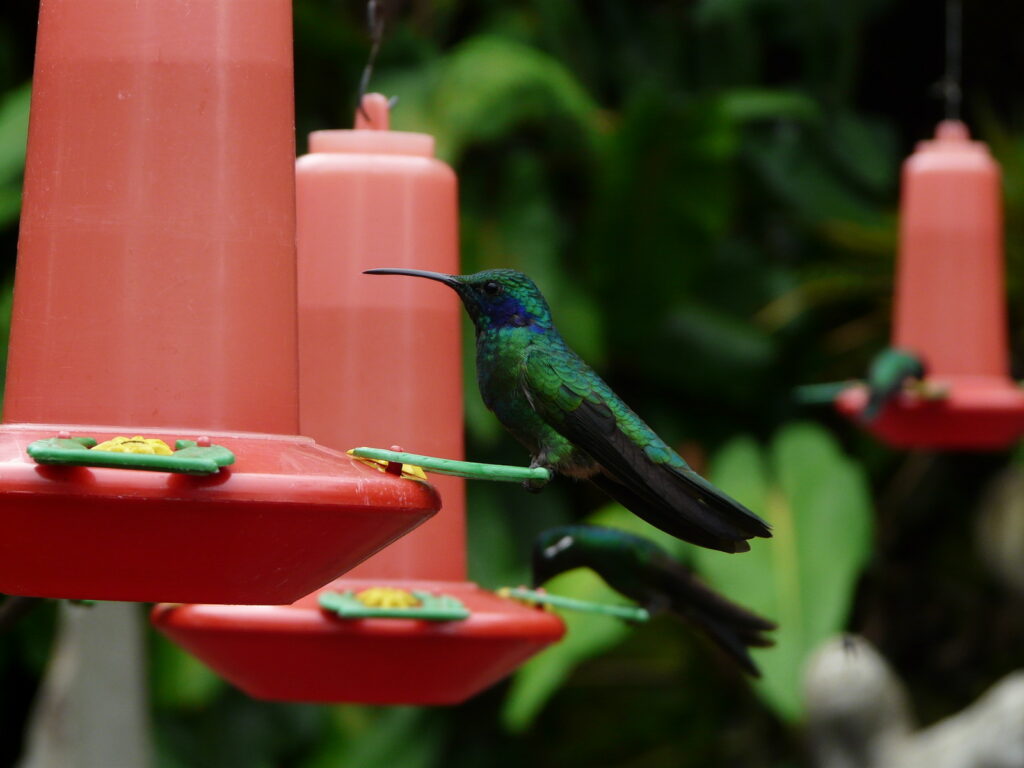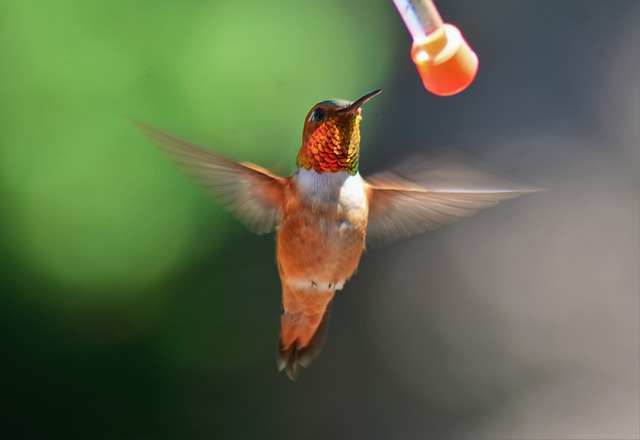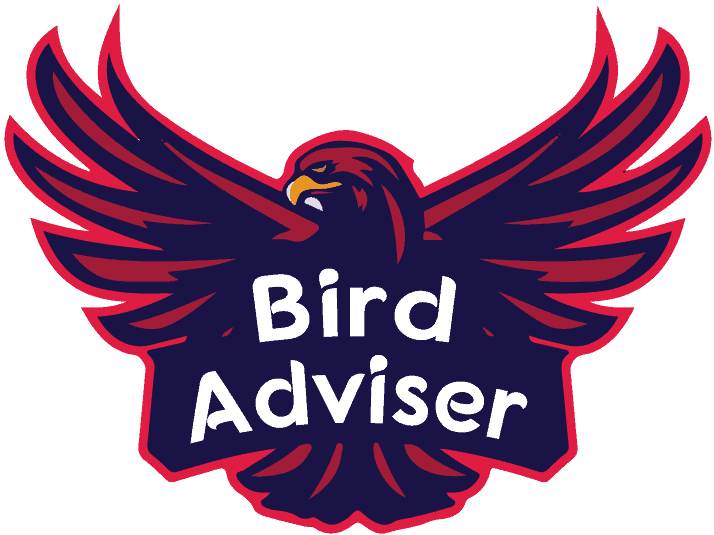One of the most common bird-feeding misconceptions is that putting hummingbird feeders out in the fall would prevent these little birds from moving.
In reality, accessible feeders can guarantee that hummingbirds have secure, healthy food sources for refilling throughout their migration routes, allowing them to complete their travels safely.
So, when do birders replace hummingbird feeders without compromising the birds’ nectar supply?
When to Stop Feeding Hummingbirds?

When to take down nectar feeders without leaving hummingbirds hungry varies by area and is influenced by various variables.
1. Climate
It’s wise to leave hummingbird feeders up later in areas where summer blooms fade rapidly or where early fall storms might disrupt bird migration.
Even if organic food sources are depleting, this will provide a stable food source for hummingbirds. It’s also a good idea to keep feeders accessible for longer if flower yields have indeed been poor over the year so that there isn’t a scarcity of nutritious nectar.
2. Location
Hummingbird feeders are naturally removed early in the fall by birders in northern areas. Hummingbird enthusiasts in Canada and Alaska’s northernmost hummingbird ranges may be able to successfully replace feeders in midsummer without injuring the hummers.
Feeders are often left up longer in southern climates. Hummingbird feeders can be put up all year in regions wherein hummingbirds are year-round inhabitants, and later migrants may overwinter.
3. Individual Considerations
Different birds take advantage of preferred food sources. Therefore, the exact timing to knock down hummingbird feeders differs between locations and within yards. Feeders must be kept clean, fed, and accessible to birds for a week after the last hummingbird has visited.
Simultaneously, birders should bear in mind that migratory hummingbirds or distinct species of hummingbirds may still be passing through the region.
It is okay to uninstall the feeders and preserve them till next spring when no hummingbirds have been seen for at least 7 to 10 days.
4. Migration
Birders may schedule when and how to take down hummingbird feeders by learning when hummingbirds migrate.
Male hummingbirds frequently migrate ahead of females, while immature birds are one of the last to go. If feeders are provided whenever these birds need to store excess fat for migration, they will remember where they were and come year after year.
As a result, it’s a good idea to keep feeders up and running during peak migratory seasons.
Can One Take Down the Feeders of Hummingbirds in Winter?
Yes! After a few weeks of seeing the final hummingbirds, it’s time to put your feeders away for the Winter. Male hummingbirds migrate south in the early and mid-summer, whereas females migrate a month later, primarily in the early fall.
Juvenile hummingbirds can spend the whole fall season at your feeders. They join migrating flocks and migrate south in the late autumn. If you’re concerned about these small critters, you might want to wait until early November to fill your feeders.
Will the Hummingbirds Stay if the Feeders are not Removed?

Not in the least! Hummingbirds move to warmer climates all year long, although if you keep your feeders out all year. Hummingbird migration has already been examined, and scientists have discovered that hummingbirds do not migrate owing to a lack of nectar.
So, why then do hummingbirds abandon their nests? Hummingbirds’ hormones cause them to move to more pleasant areas when the amount of daylight shortens in the fall and spring. Hummingbirds grow eager for migration as soon as their endocrine system produces hormones.
When to Remove Feeders of the Hummingbirds Temporarily?

Even in the heat of summer, when hummingbirds visit feeders every several minutes, nectar feeders may need to be temporarily removed to address problems and protect the birds.
Hummingbird feeders may need to be taken down for a bit to a few days to:
1. Keep Insects Away
Hornets, honeybees, wasps, preying dragonflies, and other insects like the delicious nectar that hummingbirds enjoy. If a feeder becomes overrun with insects, eliminating it for a few nights will urge the insects to go, and they will be less likely to return once the feeder is reinstated.
Trying to reduce bugs on hummingbird feeders allows the birds to use the feeders while keeping undesirable pests away.
2. Discourage Visitors
Raccoons, owls, and even bears have been known to try to fulfill their sweet need at hummingbird feeders. Withdrawing feeders a week or a few will deprive them of that food source, causing certain wildlife to seek more suitable dining options.
When the feeders are reinstalled, the birds will return, but animals will have fled the area if they can’t locate the items they seek nearby.
3. Clean and Refill Feeders
Hummingbird feeders must be carefully washed and damaged nectar removed each time they are replenished. Every few days, or if the feeders exhibit mold, mildew, or other pollution symptoms, they should be thoroughly cleaned and disinfected.
If the nectar is made ahead of time, cleaning and refilling the feeders will just take a few minutes, and also, the birds will quickly return. Some birders keep spare feeders on hand to ensure that clean, fresh feeders are accessible to the birds as soon as possible.
4. Keep Nectar From Freezing
Unexpected frosts and severe cold in the springtime or late fall can cause hummingbird nectar to freeze. Birders can withdraw feeders overnight and store them indoors to keep them liquid if required.
Ensure that the feeders are refilled in time for early hours feeding sessions. Take additional measures to prevent the nectar from freezing, allowing the feeders to remain available even on the coldest nights.
Final Words
So the answer to the issue of when to put up hummingbird feeders is largely dependent on the species, habitat, and position of the hummingbirds. However, before storing your feeders for the winter, make sure they are fully cleaned and dried.
FAQ
If you continue to feed hummingbirds, will they migrate?
Although if you put your feeders out, hummingbirds will migrate. It’s a natural inclination for them.
Do hummingbirds know who provides them with food?
Hummingbirds are clever creatures with a remarkable memory. This permits them to return to the same location year after year, provided food is still available.
Last Updated on March 22, 2023 by Lily Aldrin
